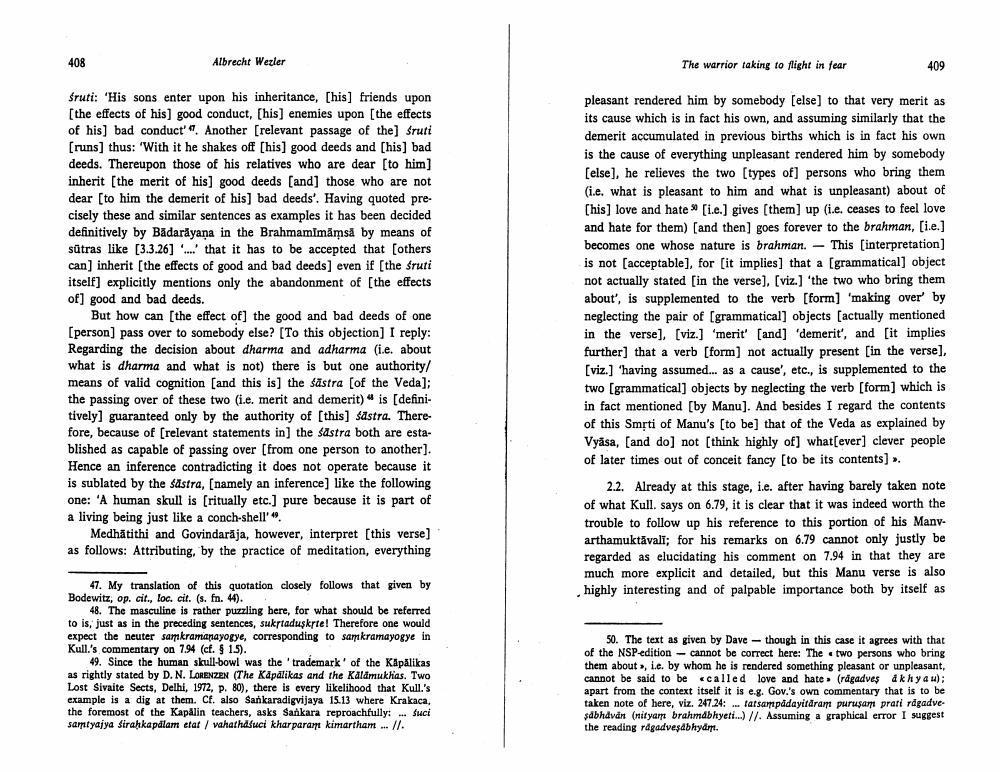________________
408
Albrecht Wezler
Śruti: 'His sons enter upon his inheritance, [his] friends upon [the effects of his] good conduct, [his] enemies upon [the effects of his] bad conduct' ". Another [relevant passage of the] śruti [runs] thus: 'With it he shakes off [his] good deeds and [his] bad deeds. Thereupon those of his relatives who are dear [to him] inherit [the merit of his] good deeds [and] those who are not dear [to him the demerit of his] bad deeds'. Having quoted precisely these and similar sentences as examples it has been decided definitively by Badarāyaṇa in the Brahmamīmāmsā by means of sūtras like [3.3.26] that it has to be accepted that [others can] inherit [the effects of good and bad deeds] even if [the śruti itself] explicitly mentions only the abandonment of [the effects of] good and bad deeds.
But how can [the effect of] the good and bad deeds of one [person] pass over to somebody else? [To this objection] I reply: Regarding the decision about dharma and adharma (ie. about what is dharma and what is not) there is but one authority/ means of valid cognition [and this is] the sastra [of the Veda]; the passing over of these two (i.e. merit and demerit)" is [definitively] guaranteed only by the authority of [this] sastra. Therefore, because of [relevant statements in] the sastra both are established as capable of passing over [from one person to another]. Hence an inference contradicting it does not operate because it is sublated by the sastra, [namely an inference] like the following one: 'A human skull is [ritually etc.] pure because it is part of a living being just like a conch-shell' "".
Medhätithi and Govindaraja, however, interpret [this verse] as follows: Attributing, by the practice of meditation, everything
47. My translation of this quotation closely follows that given by Bodewitz, op. cit., loc. cit. (s. fn. 44).
48. The masculine is rather puzzling here, for what should be referred to is, just as in the preceding sentences, sukṛtaduşkṛte! Therefore one would expect the neuter samkramanayogye, corresponding to samkramayogye in Kull.'s commentary on 7.94 (cf. § 1.5).
49. Since the human skull-bowl was the 'trademark of the Käpälikas as rightly stated by D. N. LORENZEN (The Käpälikas and the Kälämukhas. Two Lost Sivaite Sects, Delhi, 1972, p. 80), there is every likelihood that Kull.'s example is a dig at them. Cf. also Sankaradigvijaya 15.13 where Krakaca, the foremost of the Kapalin teachers, asks Sankara reproachfully: Suci samtyajya Siraḥkapālam etat / vahathaluci kharparam kimartham ... //.
The warrior taking to flight in fear
pleasant rendered him by somebody [else] to that very merit as its cause which is in fact his own, and assuming similarly that the demerit accumulated in previous births which is in fact his own is the cause of everything unpleasant rendered him by somebody [else], he relieves the two [types of] persons who bring them (i.e. what is pleasant to him and what is unpleasant) about of [his] love and hate 30 [i.e.] gives [them] up (i.e. ceases to feel love and hate for them) [and then] goes forever to the brahman, [i.e.] becomes one whose nature is brahman. This [interpretation] is not [acceptable], for [it implies] that a [grammatical] object not actually stated [in the verse], [viz.] 'the two who bring them about', is supplemented to the verb [form] 'making over' by neglecting the pair of [grammatical] objects [actually mentioned in the verse], [viz.] 'merit' [and] 'demerit', and [it implies further] that a verb [form] not actually present [in the verse], [viz.] 'having assumed... as a cause', etc., is supplemented to the two [grammatical] objects by neglecting the verb [form] which is in fact mentioned [by Manu]. And besides I regard the contents of this Smrti of Manu's [to be] that of the Veda as explained by Vyasa, [and do] not [think highly of] what [ever] clever people of later times out of conceit fancy [to be its contents] ».
-
409
2.2. Already at this stage, i.e. after having barely taken note of what Kull. says on 6.79, it is clear that it was indeed worth the trouble to follow up his reference to this portion of his Manvarthamuktavali; for his remarks on 6.79 cannot only justly be regarded as elucidating his comment on 7.94 in that they are much more explicit and detailed, but this Manu verse is also highly interesting and of palpable importance both by itself as
50. The text as given by Dave
though in this case it agrees with that of the NSP-edition cannot be correct here: The two persons who bring them about», i.e. by whom he is rendered something pleasant or unpleasant, cannot be said to be called love and hate (ragadves åkhyau); apart from the context itself it is e.g. Gov.'s own commentary that is to be taken note of here, viz. 247.24: tatsampadayitāram purusam prati ragadvesabhävän (nityam brahmåbhyeti... //. Assuming a graphical error I suggest the reading ragadveṣābhyä.




